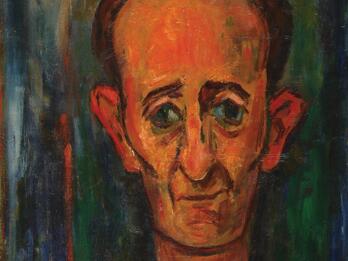Else Lasker-Schüler
The highly original German-language modernist poet, visual artist and bohemian Else Lasker-Schüler was born into a well-to-do, nonobservant Jewish family in Ebensfeld, Germany. Raised with little connection to Jewish tradition, she nevertheless wove into much of her work—particularly in her Hebräische Balladen (Hebrew Ballads) of 1913—an exploration of Jewishness, not only as a lamentable social fate but also as a font of distinctive aesthetic possibility. Moving in a milieu permeated by tropes that portrayed Jewish difference as “Oriental,” “primitive,” and “racial,” Lasker-Schüler presented herself in poetry, in playful visual art, and in a cultivated public persona as “Prince Yusuf,” a time-, ethnicity-, and gender-bending composite of Jew and Muslim, Hebrew and Arabian, ancient Egyptian and medieval Near Eastern, man and woman. Moving in German expressionist and avant-garde circles in Berlin and Munich, she also cultivated close relations with intellectuals interested in ideas of Jewish national renaissance and, in the 1920s, close relations with displaced East European Jewish Hebrew and Yiddish literati like the poet Uri Zvi Greenberg and Avrom Stencl. She lost her only child to tuberculosis in 1927. With the rise of the Nazi Party, Lasker-Schüler fled to Switzerland in 1933 and settled in Palestine in 1939. She spent her last years despondent in Jerusalem, largely unable to find a way into the new society or its literary scene, though her legacy is visible in some later Israeli poetry. Lasker-Schüler is distinctive among German Jewish writers of her generation for the degree to which she identified with Jewish culture and yet famously resisted the translation of her poems into Hebrew because, as she cryptically claimed, her writing had “already” been conceived in Hebrew. Though her idiosyncratic aestheticism sometimes brought her surprisingly close to rightist figures, from Uri Zvi Greenberg to the expressionist poet Gottfried Benn, with whom she maintained a romantic relationship for two decades prior to 1933, Lasker-Schüler embraced progressive ideals, including women’s liberation and Jewish-Palestinian amity.


